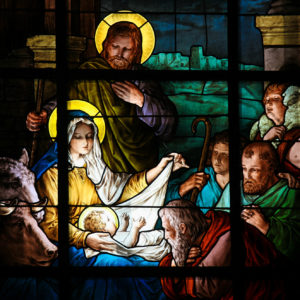Editor’s Note: For another viewpoint, see Counterpoint: The Greatest Gift This Season — Freedom Of Religion
So the other day, a friend asked me a question that boiled down to this: Does Christmas have to be a religious holiday?
My immediate response — as a person of faith who follows Jesus and as an Episcopal priest — was, “Well, yeah …”
I mean, what else would it be?
And then immediately I thought of all those people who are not believers who celebrate Christmas because society does, and do so without too many worries because, well … society celebrates it.
We have sales. We have sing-a-longs. We have trees. We have presents to give and to receive. We have parties.
So… in theory, no, it doesn’t have to be a religious holiday.
But…
If it weren’t for the religious aspect, would we be doing all this celebrating?
If it weren’t for the fact that on Christmas, we celebrate the joyful news that God reached down into our messy, messed-up lives and became human, that God came to us as a little baby, innocent and in need of help, in order to show us a new way to live, a new way to love, a way to literally touch the face of God?
I realize that long before the birth of Jesus, the Winter Solstice was celebrated, but trust me, that celebration is nothing compared to how we celebrate Christmas, especially today, especially in the Western world.
So, in reality, yes, Christmas has to be a religious holy day. There’s no way around it.
Christmas is — and there’s no way around this — the celebration and commemoration of one of the holiest moments in humanity’s history. This child who was born turned the world upside down and inside out, and changed the trajectory of human history. No one else — no other person — has changed the world as much as Jesus — for good and for bad.
The fact that society has co-opted the holiday, in great part to make an obscene amount of money, doesn’t change the singular, defining fact of Christmas: This is a religious holy day.
The fact that many people who do not believe in Jesus celebrate it? That’s societal pressure. Because for most non-believers, the “celebration” is focused on parties, and decorating, and gift buying and gift giving and gift receiving, none of which has anything to do with the actual meaning of Christmas.
I know it’s sounds trite, but the reason for the season truly is … Jesus.
Don’t get me wrong: I’m no Scrooge. I’m happy to help people celebrate even if they don’t believe in Jesus. I wish Merry Christmas to total strangers. I’m delighted to ooh and aah over decorations. I like Christmas movies, and try to see the original “Grinch” each year. I help parents and grandparents pull off the Santa story every year.
But given half a chance to talk about the real meaning of Christmas, to talk about this incredible moment of God breaking into our lives in a way that was at once powerful and vulnerable, that allowed us to see God face to face, to touch God’s face, to demonstrate God’s love in new and earth-shattering ways?
You bet I will make my declaration, which is simple and to the point: Christmas is about God. Christmas is about God’s love. Christmas is a religious holy day.
Everything else in the season? All the stuff about Santa and Rudolph and parties and spending money and trees and lights? That stuff is nothing but gravy.
God’s love is the point of the season.
And the only way to understand that is to take the leap of faith to believe in God in the first place. So, please, do celebrate Christmas, especially this year, especially and even in defiance of the coronavirus pandemic.
But please, remember: Jesus is the reason for the season.

